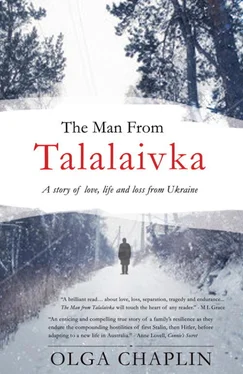A long way off a child’s cry, short and seemingly insignificant, pierced the hazy air. Evdokia, lightheaded from hunger at service end, did not fully comprehend its meaning. The children returned. Manya, limping and ashen faced, smiled at her tired, pregnant mother. She could not tell her of their forbidden play at the antiquated rusty maypole. She had always tried to please her mother, and in a few short weeks, some little gift might come when she reached her ninth birthday. Hiding her pain, she bent among the grasses and picked a handful of delicate wildflowers for her patient mother.
“Dopobachenya, staroste,” Evdokia smiled as she farewelled several elders from the neighbouring kolkhoz. She hesitated, breathing in the warmth of late morning and watched nature’s winged creatures at work as she waited for her husband. Peter, frowning and in serious conversation with a trusted friend, stood back as they turned homeward to the kolkhoz farmhouse. She sensed something was disturbing him but, already at a short distance from the men, she was unable to distinguish their words. “Another kolkhoz matter…” she conjectured, “he will tell me, in good time, at home.” She continued slowly, heavily, back to the dim dwelling.
With only the seasons to guide her, in a kolkhoz and regime intent on controlling even the drudgery of daily work life, she was unaware of the date, of its significance: Sunday 22nd June, 1941. Peter knew better. Aware of the war in western Europe, he understood the political implications of that singular date. Concerned for her delicate condition, he did not tell her, that day. He knew too well what it meant for Russia, and especially for the Ukraine. To her eternal sorrow, Evdokia would soon know, always remember that date.

Chapter 18
An uneasy drone of loaded aircraft, until recent days unheard of over the kolkhoz fields of Popivshchena, caught Evdokia’s attention. She looked up, squinting into the late afternoon sun. A dozen angry fighter planes cut westward across the sun’s rays, dotting its deceptively warming vista with moth-like precision. She straightened, arched her back and leaned on the heavy primitive hoe for support. Elderly workers passed her as they chopped at their own endless rows of sugar beet. She could not complain. It was tiring work, but tolerable compared to the heavy lifting and threshing the able-bodied workers were subjected to, since Comrade Stalin’s edict that harvesting be completed at breakneck speed.
Everywhere about them, hues of red and gold rays of the setting sun sprayed the kolkhoz fields, showering workers with unspoken praise for their back-breaking work, their excelled quotas, their devotion to the cause, at Stalin’s behest. She shuddered as she thought of these same red hues that must have vaingloriously splayed the fields surrounding Lvov with human carnage and sacrifice, before that proud city and its inhabitants prepared to surrender to the German armies. “Hospode; Hospode,” she prayed silently, “protect my little brother Makar.” It was one of a million silent prayers for the safe return of the conscripted men throughout the Ukraine and Russia. She shook her head, wondering what was to become of these Russian fighter planes, and of their pilots.
Reports were so limited, so unreliable. Stalin’s propaganda was so effective that even the soviet officials of the trusted bureaucracy, barking Stalin’s orders almost daily, knew little of the fierce battles raging in the west of the Ukraine, of the real carnage and loss of patriotic lives so soon after Hitler’s three-pronged invasion of their lands. Instead, the panic was conveyed in urgent quotas for production and harvesting, longer hours of work on the kolkhoz fields, and appeals to patriotism for the Motherland interspersed with threats of reprisal for disloyalty and cowardice. This propaganda, passed on daily by grim-faced soviet officials on the dilapidated army truck that collected the wary workers, assured them the German menace had been halted and the enemy would soon be forced back to its own territory, the Motherland would be victorious once again.
“Kincheyete tyt!” the foreman shouted at last, signalling to them to stop work. Evdokia climbed onto the waiting truck, grateful her pregnant condition permitted her return to the kolkhoz farmhouse in its first load. She was anxious about Manya, who was still ailing and had remained at the farmhouse with an elder. It was uncharacteristic of her little daughter not to want to join Vanya and Mykola in the stacking of hay in these fields, the only outward sign of youth and merriment for the kolkhoz workers, as children played and sang and helped with the growing haystacks. She determined to speak to Peter about Manya’s condition. She knew that he, too, was burdened with excessive work, returning home later and later each night, his responsibilities of veterinary supervision extending far beyond his previously allocated areas.
* * *
Manya, looking gaunt and exhausted, limped towards her mother the moment Evdokia came through the farmhouse door. She threw her fevered body and thin arms around her mother’s neck. “Mama, Mama, thank heaven you are here,” she whimpered. A sense of panic wrenched through Evdokia. Manya had always been so placid, so undemanding. Even though her troublesome knee did not seem to be healing, her little girl, in grown-up fashion, had bandaged it, saying, “It is nothing, nothing, just a little fall; it will heal, you will see, Mama.” Evdokia puzzled at what next to do. All these past years of good fortune in the health of their children had left her ill-equipped to sense this emergency.
The farmhouse door flew open. Evdokia rushed to see if Peter had arrived, hopefully earlier that evening. It was Hresha, the senior kolkhoz official, with urgent news. Comrade Stalin had just broadcast his first national speech, from the safety of the Kremlin. Evdokia, exhausted and anxious over Manya’s condition, could not fully comprehend what this madman was saying. Comrade Stalin could not possibly mean they were to prepare for a battle, for packing and loading what possessions they could carry, and to burn their ancient farmhouses, the only shelter they had in this Sumskaya Oblast, and to then retreat eastward to Russia and the Ural Mountains with whatever livestock they could tether. There had to be some mistake. Hresha was a highly-strung man, imbued with Stalinist ideals. He must have misunderstood Stalin’s orders. The totalitarian dictator of Russia would not have pursued collectivisation all these years, only to destroy the very farms and crops that fed his empire. Their lives, and region, could not be in the kind of danger this mad zealot was preaching.
Peter, pushing back exhaustion, came in thoughtfully as the kolkhoz families, panicked by the turn of events, argued with the soviet official. He put his arm gently on Evdokia’s shoulder, averting his eyes from the distressed babushka crying, “Oi Boje mie; oi Boje mie” nearby. He, too, had earlier heard of Stalin’s speech. He fully understood its import. It was the tyrant’s strategy to stop Hitler’s armies taking Moscow, and possibly Russia. Stalin was using another previous Tsar’s strategy, used so effectively against Napoleon’s huge armies, the ‘scorched earth’ policy, to stop the enemy’s advancing armies, regardless of the human cost. Peter knew the Ukraine’s value to both Hitler and Stalin was far too great. Either way, his Ukraine, and its hapless people, would pay a shocking price for being vital to the ambitions of these two totalitarian tyrants.
The nightmare did not leave them that night. Manya’s cries and moans revealed her burning temperature and the full extent of her injury. Evdokia had tried all the homemade potions, to no avail. Peter knew fast action was needed, regardless of the military panic from without. Even in the dim flicker of candlelight, his little daughter’s swollen, discoloured knee meant it was a deep infection, even, possibly, septicaemia. Evdokia, tired and overworked, and accepting their little daughter’s assurances, had not been fully aware how quickly this injury had changed.
Читать дальше













